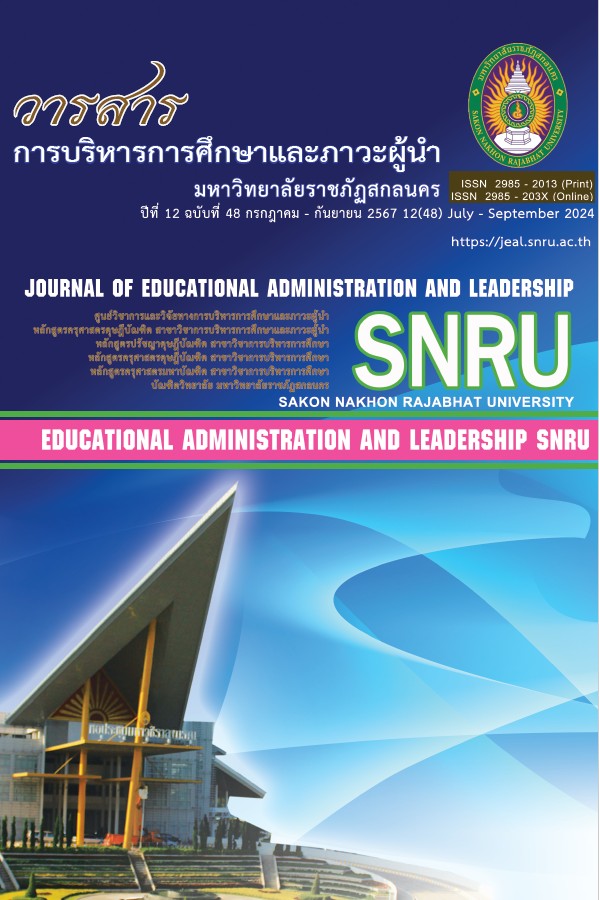

ปัจจัยการบริหารที่ส่งผลต่อประสิทธิภาพการบริหารงานโรงเรียนยุคดิจิทัลของโรงเรียน ในสังกัดสำนักงานเขตพื้นที่การศึกษาประถมศึกษานครพนม เขต 2
Administrative Factors Affecting Efficiency of School Administration in the Digital Era within Schools Under Nakhon Phanom Primary Educational Service Area Office 2
ผู้แต่ง
ประจักษ์ เชื้อคำจันทร์, สายันต์ บุญใบ, ภัทรดร จั้นวันดี, วีรวัฒน์ คำแสนพันธ์
Author
Prajak Cheakhamjan, Sayan Boonbai, Pataradron Junwandee, Weerawat Khamsaenpan
บทคัดย่อ
การวิจัยครั้งนี้มีวัตถุประสงค์เพื่อศึกษา เปรียบเทียบ ศึกษาความสัมพันธ์ อำนาจพยากรณ์ และหาแนวทางการพัฒนาปัจจัยการบริหารที่ส่งผลต่อประสิทธิภาพการบริหารงานโรงเรียนยุคดิจิทัลของโรงเรียนในสังกัดสำนักงานเขตพื้นที่การศึกษาประถมศึกษานครพนม เขต 2 ตามความคิดเห็นของผู้อำนวยการโรงเรียนและครูผู้สอน จำแนกตามสถานภาพการดำรงตำแหน่ง ขนาดของโรงเรียน และประสบการณ์ในการปฏิบัติงาน กลุ่มตัวอย่างที่ใช้ในการวิจัย ผู้อำนวยการโรงเรียน และครูผู้สอน ปีการศึกษา 2566 จำนวน 326 คน การสุ่มกลุ่มตัวอย่างใช้การสุ่มแบบแบ่งชั้น ประกอบด้วย ผู้อำนวยการโรงเรียน จำนวน 93 คน และครูผู้สอน จำนวน 233 คน จาก 93 โรงเรียน เครื่องมือที่ใช้ในการวิจัย คือ แบบสอบถามประมาณค่า 2 ด้าน คือ ด้านที่ 1 ปัจจัยการบริหาร มีค่าอำนาจจำแนกอยู่ระหว่าง 0.537 - 0.834 และมีค่าความเชื่อมั่น เท่ากับ 0.971 ด้านที่ 2 ประสิทธิภาพการบริหารงานโรงเรียนยุคดิจิทัล มีค่าอำนาจจำแนกอยู่ระหว่าง 0.676 - 0.907 และมีค่าความเชื่อมั่น เท่ากับ 0.976 และแบบสัมภาษณ์แบบมีโครงสร้าง สถิติที่ใช้ในการวิเคราะห์ข้อมูล ได้แก่ ความถี่ ร้อยละ ค่าเฉลี่ย ส่วนเบี่ยงเบนมาตรฐาน สถิติทดสอบค่าที การวิเคราะห์ความแปรปรวนทางเดียว ค่าสัมประสิทธิ์สหสัมพันธ์อย่างง่ายของเพียร์สัน และการวิเคราะห์การถดถอยพหุคูณแต่ละขั้นตอน ผลการวิจัยพบว่า 1. ปัจจัยการบริหาร โดยรวม อยู่ในระดับมาก 2. ประสิทธิภาพการบริหารงานโรงเรียนยุคดิจิทัล โดยรวม อยู่ในระดับมาก 3. ปัจจัยการบริหาร พบว่า จำแนกตามสถานภาพการดำรงตำแหน่ง โดยรวมแตกต่างกันอย่างมีนัยสำคัญทางสถิติที่ระดับ .05 จำแนกตามขนาดโรงเรียน และจำแนกตามประสบการณ์ในการปฏิบัติงาน โดยรวมแตกต่างกันอย่างมีนัยสำคัญทางสถิติที่ระดับ .01 4. ประสิทธิภาพการบริหารงานโรงเรียนยุคดิจิทัล พบว่า จำแนกตามสถานภาพการดำรงตำแหน่ง โดยรวมไม่แตกต่างกัน จำแนกตามขนาดโรงเรียน และจำแนกตามประสบการณ์ในการปฏิบัติงาน โดยรวมแตกต่างกันอย่างมีนัยสำคัญทางสถิติที่ระดับ .01 5. ปัจจัยการบริหารและประสิทธิภาพการบริหารงานโรงเรียนยุคดิจิทัล โดยรวมมีความสัมพันธ์ทางบวกอยู่ในระดับสูง อย่างมีนัยสำคัญทางสถิติที่ระดับ .01 6. ปัจจัยการบริหาร ด้านโครงสร้างองค์การ ด้านงบประมาณ ด้านเทคโนโลยีสารสนเทศ และด้านการพัฒนาบุคลากร สามารถพยากรณ์ประสิทธิภาพการบริหารงานโรงเรียนยุคดิจิทัล ได้ร้อยละ 65.5 และมีความคลาดเคลื่อนมาตรฐานของการพยากรณ์เท่ากับ ±0.32183 7. แนวทางการพัฒนาปัจจัยการบริหารที่ส่งผลต่อประสิทธิภาพการบริหารงานโรงเรียนยุคดิจิทัล ควรได้รับการพัฒนา จำนวน 4 ด้าน ได้แก่ 1) ด้านงบประมาณ โดยการมีแผนการใช้งบประมาณที่ชัดเจน 2) ด้านโครงสร้างองค์การ โดยการจัดวางบุคลากรให้เหมาะสมกับงานที่ถนัด 3) ด้านเทคโนโลยีสารสนเทศ โดยการจัดหาเทคโนโลยีสารสนเทศให้เพียงพอต่อการใช้งาน 4) ด้านการพัฒนาบุคลากร โดยการส่งเสริม สนับสนุน ให้บุคลากรได้รับการอบรม ศึกษาต่อ
Abstract
The purposes of this research were to examine, compare, determine the relationship, identify the predictive power, and establish guidelines for developing administrative factors affecting the efficiency of school administration in the digital era within schools under Nakhon Phanom Primary Educational Service Area Office 2, as perceived by school directors and teachers with different positions, school sizes, and work experience. The sample size was determined using the Krejcie and Morgan table and Multi-Stage Random Sampling. which yielded a total of 326 participants consisting of 93 school directors and 233 teachers from 93 schools under Nakhon Phanom Primary Educational Service Area Office 2, in the 2023 academic year. The research instrument included a set of questionnaires containing two aspects: Aspect 1: Administrative Factors, with the predictive power ranging between 0.537 and 0.834 and the reliability of 0.971; Aspect 2 Efficiency of School Administration in the Digital Era, with the predictive power ranging between 0.676 and 0.907 and the reliability of 0.976. The structured Interviews were also employed for data collection. Statistics for data analysis were frequency, percentage, mean, and standard deviation. Data were analyzed using t - test, One - Way ANOVA, Pearson's product - moment correlation coefficient, and Stepwise multiple regression analysis. The findings were as follows: 1. The administrative factors were overall at a high level. 2. The efficiency of school administration in the digital era was overall at a high level. 3. The overall administrative factors showed differences in terms of positions at the .05 level of significance. In terms of school sizes, and work experience, differences were observed, with the .01 level of significance overall. 4. The efficiency of school administration in the digital era, in terms of positions, showed no differences overall; In terms of school sizes, and work experience, there was a difference at the .01 level of significance overall. 5. The administrative factors and the efficiency of school administration in the digital era showed a positive relationship at the .01 level of significance with a highly positive level. 6. The administrative factors in terms of organizational structure, budget, information technology, and personnel development were able to predict the efficiency of school administration in the digital era at the .01 level of significance with the predictive power of 65.5 percent and the standard error of estimate of ±0.32183. 7. The guidelines for developing administrative factors affecting the efficiency of school administration in the digital era needing improvement consisted of four aspects: 1) Budget: Ensuring a clear budget allocation, adherence to regulations, and efficient utilization; 2) Organizational Structure: Assigning personnel to the roles that match their expertise, and establishing a clear position structure, and developing transparent work plans: 3) Information technology: Providing adequate information technology for work use, and ensuring efficient utilization; and 4) Personnel Development: Encouraging and supporting personnel to attend training, pursue further education, and develop abilities suitable to individual work tasks
คำสำคัญ
ปัจจัยการบริหาร, ประสิทธิภาพการบริหารยุคดิจิทัลKeyword
Administrative Factors, Efficiency of School Administration in the Digital EraNotice: Undefined variable: dataSet in /var/www/html/ArticleView.php on line 116
Notice: Trying to access array offset on value of type null in /var/www/html/ArticleView.php on line 116
บทความทุกบทความเป็นลิขสิทธิ์ของ
Notice: Undefined variable: dataSet in /var/www/html/ArticleView.php on line 116
Notice: Trying to access array offset on value of type null in /var/www/html/ArticleView.php on line 116
เท่านั้น
กำลังออนไลน์: 10
วันนี้: 5,260
เมื่อวานนี้: 18,298
จำนวนครั้งการเข้าชม: 1,111,241
อาคารบัณฑิตวิทยาลัย ชั้น 2 ตำบลธาตุเชิงชุม อำเภอเมือง จังหวัดสกลนคร 47000
โทร/
แฟกซ์ 0-4297-0093
บรรณาธิการ: รองศาสตราจารย์ ดร.ไชยา ภาวะบุตร
ติดต่อ/สอบถาม: นายธีรเวทย์ เพียรธัญญกรณ์
โทร: 0-4297-0093